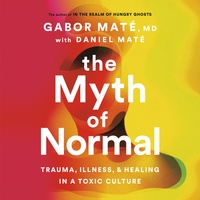Take a photo of a barcode or cover
informative
reflective
medium-paced
The book starts out strong but loses the thread as it goes. Maté begins showing the indisputable evidence that trauma affects physical health (note: much of the evidence is based on research by Bessel van der Kolk, whose book The Body Keeps the Score I'm only in the beginning stages of but I suspect will provide a much more science-based theory). However, as the book progresses, he contends that there is actually no genetic cause for many mental illnesses and addiction issues, and that they are entirely caused by trauma and mind body disconnect. I have a lot of thoughts about how this is a vast over simplification of the science at best and straight up dangerous homeopathy at worst, but Nick Haslam's review of the book for The Conversation says it better than I could. I highly recommend the whole thing (https://theconversation.com/gabor-mate-claims-trauma-contributes-to-everything-from-cancer-to-adhd-but-what-does-the-evidence-say-207144), but this section is a particularly good summation of the issue:
In his latest book, The Myth of Normal, Gabor Maté offers a diagnosis for our health crisis. The problem, he suggests, is the burden of trauma people endure and the toxic culture that creates and compounds it. He prescribes profound societal change, holistic healing practices and spiritual growth assisted by psychedelics.
Both diagnosis and prescription have proven to be controversial. Skeptics worry that Maté’s explanations for ill health oversimplify a complex and incompletely understood web of causes and that his solutions dart ahead of the scientific evidence, sometimes veering towards quackery.
Maté presents a lot of interesting and introspective concepts, and for that I think it's worth reading--with a large grain of salt. Towards the end of the book, he praises the story of a woman who allegedly cured her advanced cancer with what amounts to veganism and positive thinking, with no cautionary warning that, if this even did happen, it won't work for the vast, vast majority of people a la Steve Jobs. It was an infuriating, borderline dangerous section, and had it been towards the beginning, I likely would have stopped there. But Maté is admittedly a very compelling writer, and at that point I was invested, because his exploration of trauma and the effects it has on the body were authentic and incredibly interesting, even if his recommended cures venture into borderline pseudoscience.
I listened to the audiobook version of this book, and will just say that I recommend reading it instead. The narrator insists upon doing stereotypical, borderline offensive accents for quotes, and is completely flat otherwise.
informative
inspiring
reflective
medium-paced
Different than what I expected based on the title, but I did enjoy this book. Gave a lot to chew on.
It was sudden. The first 30+ pages have some incredibly compassionate, nuanced and yet clear, and important illustrations of trauma, how it can work, how you might recognize its impact. But I have little tolerance for psychotherapists proclaiming simple, generalizable narratives about trauma from single human stories. This isn’t the first time Maté’s writing takes this stance, but it was blessedly absent as I got through the first 30 pages. I was really hopeful the entire book would preserve this attention and respect for the complexity of human story.
But then it came. First one “analysis”, almost off the cuff and in fairly clear contradiction to the person whose story was being recounted: “This man’s impulse to protect his mother was not a defense against anything I had said or implied but against his own unacknowledged anger” (p.30). I wonder how “this man” felt (or was made to feel) about being described in this way?
Then again, as a general proclamation about human psychology and its rootedness in trauma: “Nobody is born with such traits [superautonomous self-sufficiency]. They invariably stem from coping reactions to developmental trauma” (p. 38). If you grasp the subtlety of his statement about big vs little “-t” “trauma,” you can read this sentence with a bit more nuance. And yet the word “trauma” packs a cultural punch that overwhelms such nuance, especially when used by a psychotherapist as a way to interpret someone’s psychology. #Unhelpful.
It’s not that his analysis is “wrong” — it’s that it’s presented as simple fact (either right or wrong) rather than as a complex frame for additional insight, curiosity, or learning. Given the author’s position of power and influence over those with whom he works, this level of disrespectful arrogance deserves to be named and called out. The time of therapists proclaiming their own insights about their “patients” is long over.
But then it came. First one “analysis”, almost off the cuff and in fairly clear contradiction to the person whose story was being recounted: “This man’s impulse to protect his mother was not a defense against anything I had said or implied but against his own unacknowledged anger” (p.30). I wonder how “this man” felt (or was made to feel) about being described in this way?
Then again, as a general proclamation about human psychology and its rootedness in trauma: “Nobody is born with such traits [superautonomous self-sufficiency]. They invariably stem from coping reactions to developmental trauma” (p. 38). If you grasp the subtlety of his statement about big vs little “-t” “trauma,” you can read this sentence with a bit more nuance. And yet the word “trauma” packs a cultural punch that overwhelms such nuance, especially when used by a psychotherapist as a way to interpret someone’s psychology. #Unhelpful.
It’s not that his analysis is “wrong” — it’s that it’s presented as simple fact (either right or wrong) rather than as a complex frame for additional insight, curiosity, or learning. Given the author’s position of power and influence over those with whom he works, this level of disrespectful arrogance deserves to be named and called out. The time of therapists proclaiming their own insights about their “patients” is long over.
informative
reflective
slow-paced
informative
slow-paced
honestly this book is a mess in a lot of ways like
i do not like the way the author talks abt disability as this massive tragedy and the worst thing that could have happened to a person while simultaneously shunning anyone who has made peace with their disability. it s fucking weird.
I think another aspect that maybe weirds me out a lot as well is that there are a lot of really good points in this regarding the impact on immune system that repressing one’s emotions is and how he talks about addiction and societal influence into this and the spiritual part of self that also needs tending to.
i do not like the way the author talks abt disability as this massive tragedy and the worst thing that could have happened to a person while simultaneously shunning anyone who has made peace with their disability. it s fucking weird.
I think another aspect that maybe weirds me out a lot as well is that there are a lot of really good points in this regarding the impact on immune system that repressing one’s emotions is and how he talks about addiction and societal influence into this and the spiritual part of self that also needs tending to.
This book is phenomenal. I learnt the lessons that I somehow felt existed within me but I could never describe them in words. Human pain and suffering is one thing. It was in no time when I was finished with the book. As a fellow human being, my thoughts and mind dynamics match with the people mentioned in the book. It was so relatable and eye opening, the reality of society and human psychology. I wouldn't say I've experienced all scenarios but yes most of them if not experienced atleast I've thought about them. It was a fantastic read.
I tried to give it a chance, I really did...
This is not for me, my perspectives to not align with the author's.
And no, ADHD is not a "mental disease".
This is not for me, my perspectives to not align with the author's.
And no, ADHD is not a "mental disease".
challenging
emotional
informative
reflective
slow-paced






